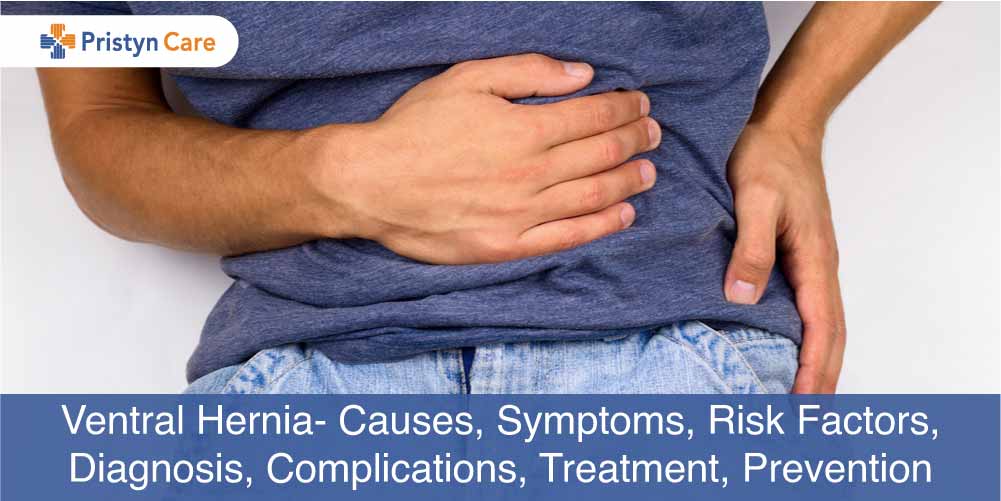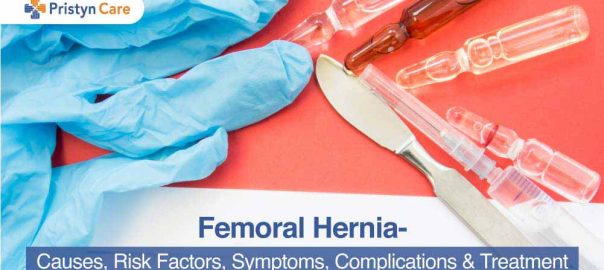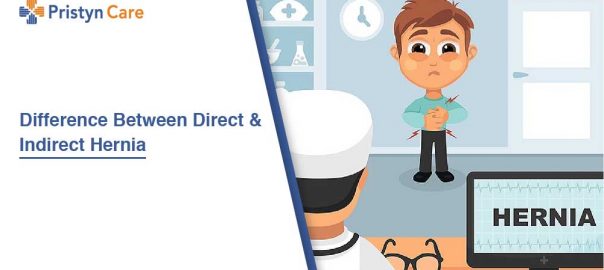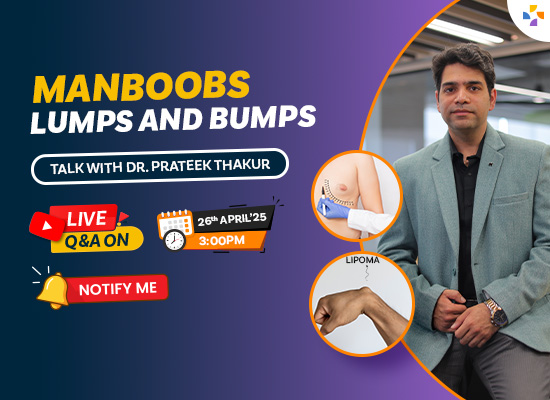![]() Views: 2,491
Views: 2,491
Ventral Hernia- Causes, Symptoms, Risk Factors, Diagnosis, Complications, Treatment, Prevention
The hernia that occurs along the vertical center of the abdomen is a ventral hernia. It can occur at any location of the abdominal wall.
Dedicated Support at Every Step!
Our Doctors are available 24 hours a day, 7 days a week to help you!
Table of Contents
What is Ventral Hernia
When there is an opening in the abdominal muscles due to any weakening, such that a loop of intestine or abdominal tissues pushes through the layer, then it is known as a ventral hernia.
Based on where the hernia has developed, a ventral hernia is generally of three types-
- Epigastric hernia- This develops below the breastbone of the navel.
- Umbilical hernia- This develops around the belly-button.
- Incisional hernia- This develops at the location of previous surgery.
Causes of Ventral Hernia
When there is a weakness around the incision of previous abdominal surgery, it can put extra strain on the walls of the muscles that can lead to a hernia. Some factors that can cause the muscles to weaken are-
- Defect present since birth
- Infection at the surgical site
- Failed surgical repair or mesh placement
Risk Factors of Ventral Hernia
There are some risk factors also that can contribute to the development of a ventral hernia. Watch out for the following factors to reduce the risk of developing a ventral hernia-
- Being overweight
- Recurrent episodes of coughing
- Vomiting that doesn’t stop
- Excessive straining during a bowel movement or urinating
- A severe blow to the abdomen
- Being pregnant
- Enlargement of the prostate gland
- Diseases such as emphysema or chronic obstructive pulmonary disease
- Older age
Symptoms of Ventral Hernia
A person may not show any sign or symptom in the initial stages of ventral hernia development. In some cases, it may even take weeks to experience any symptoms.
Initially, the person starts with mild discomfort or severe pain in the herniated area when trying to stand or lifting heavy objects. There can be a visible bulging also.
Other than the above, in severe cases, one can experience the following-
- Mild discomfort in the abdominal area
- Redness and Pain
- Feeling of nausea
- Feeling of vomiting
Diagnosis of Ventral Hernia
Once you have reached the hospital, the doctor asks about the symptoms and performs a physical examination. In order to make a proper diagnosis, they generally suggest the following imaging tests-
- Abdominal ultrasound
- CT scan
- MRI scan
Complications of Ventral Hernia
Leaving a hernia untreated for long is not advisable. Here are some possible complications that can occur when a ventral hernia is left untreated.
- Increase in the size of ventral hernia
- The excruciating pain that gets worse over time
- Difficulty in making bowel movements
- Changes in body postures
Some more severe complications include-
- Incarceration- The intestine gets trapped in the weakened area such that it cannot be pushed back to the abdominal cavity.
- Strangulation- This is a very serious condition in which the blood flow to the intestine is restricted that leads to decaying of the intestine or worse, its death. This requires immediate medical help.
Treatment of Ventral Hernia
The treatment of ventral hernia is decided by the hernia surgeon depending on certain factors. Some of them are-
- Previous surgeries in the abdomen
- Location of the hernia- too difficult to reach or not
- Any other medical conditions
There are generally two ways in which a ventral hernia can be repaired- conventional open surgery and laparoscopic hernia repair.
Traditional Open Ventral Hernia Repair
In this type of surgery, through a large incision, the general surgeon puts back the protruded organ to its place and places a 3D mesh in the weakened area. Then the incision is stitched which requires over 3-4 weeks to heal. The whole procedure is performed under the influence of anesthesia.
Laparoscopic Ventral Hernia Repair
Before going for the surgery, preparation is of great importance. This reduces the chances of any complication as well as ensures that the patients recover as soon as possible.
Here’s a guide on how you can prepare yourself before the ventral hernia treatment.
- Carry all your diagnostic test reports- blood test, medical evaluation, chest x-ray on the day of the surgery.
- Shower the night before or the morning of the operation.
- Make sure your colon is empty and clean on the day of the surgery.
- Do not eat or drink anything (except medicines prescribed by the doctor) after midnight the night before the operation.
- Blood thinners or anti-inflammatory medicines and Vitamin E are generally recommended to be stopped a week before the surgery. Ask your doctor if you have any queries regarding the same.
- Ask someone to stay with you after a few days of the surgery.
A patient is administered with anesthesia. During a laparoscopic ventral hernia repair, a long slender device known as the laparoscope is inserted through small incisions of ¼ or ½ inches in the abdomen. The device has a camera mounted on the top that helps the doctors see the inside the abdomen.
After this, similar to open repair, a surgical mesh is fixed near the weakened area that provides strength to the surrounding tissues. To hold the 3D mesh, sutures are also placed in the abdomen.
Some of the advantages of Laparoscopic ventral hernia repair-
- Minimal post-operative pain
- Shorter hospital stay
- Faster return to daily activities
- Minimal chances of complications
What To Expect After Laparoscopic Ventral Hernia Repair
After the laparoscopic surgery for a ventral hernia, you might feel a little dizzy and nauseated due to the general anesthesia administered before the surgery.
You might have to stay for 24 hours after the surgery at the hospital under the doctor’s observation and then only discharged.
- Diet
It is quite normal for patients after the surgery to have a poor appetite for a week or two. There’s nothing to worry about as this gradually improves with time.
- Showering
It is better to take a shower than taking a bath or a dip in the pool for two weeks. Make sure you don’t wet the incision area too much.
- Wound care
Within 7 to 10 days after the surgery, the wound will dry on its own. Hence, don’t try to put any other medicines or ointments on your own to heal the wound faster because it just won’t.
After you’ve touched the incision area, make sure you wash the hands.
- Activities
Let pain be your guide. Other than this, there are no major medical restrictions after laparoscopic hernia repair. So you can-
-Take a brisk walk
-Climb stairs
-Have sexual intercourse
-Mow the lawn
-Practice mild exercises
But stop doing it if you don’t feel like it. You will be exhausted or fatigued faster than usual which is quite normal.
- Driving
Ask someone to drive for you when going outside. The pain medicines can cause a sense of confusion which can prove to be fatal during driving.
- Bowel movements
The bowel movement regularizes over the recovery period. You can have constipation or diarrhea in the initial days of the recovery. However, if these are too severe then contact your general surgeon.
Lifestyle Changes for Ventral Hernia
After ventral hernia surgery, it is important that you make some modifications to your lifestyle. Here are some lifestyle changes that reduce the risk of developing a hernia again.
- Exercise regularly after the surgery to shed the extra pounds as this can put extra pressure on the muscles. Engage yourself in some light or moderate exercises. Avoid lifting heavy weights if you have developed a ventral hernia before. Talk to the hernia surgeon before starting to exercise. Remember not to exercise immediately after eating a meal.
- Quit consuming alcohol as this can cause dehydration and induce constipation. In some cases, it can prove to be fatal also.
- Apply ice to the affected area to reduce the pain or swelling.
- Don’t wear tight clothes to reduce the pressure around the abdomen. Wear loose and cotton clothes to feel free and comfortable.
- Avoid or manage stress by performing yoga or breathing exercises or meditation. This is important because stress can cause acid refluxes or stomachaches.
- A large portion of meals can have adverse effects on the body. Take smaller frequent bites. This also helps to reduce weight and get in proper shape.
- Avoid sleeping, bending or lying down completely after eating.
Home Remedies for Ventral Hernia
It is important to keep in mind that the home remedies for ventral hernia should not be considered as an alternative treatment option to the proper treatment suggested by the doctor.
These remedies only help to get relief from the symptoms and assist in living a better life. Make sure that you try these remedies only after proper consultation with the hernia surgeon.
Here are some home remedies that you can try for ventral hernia symptoms-
- Ginger
You can take ginger in an appropriate amount for a ventral hernia that can help in protecting the stomach and food pipe from the damage caused due to bile and gastric acid buildup. - Licorice
Several problems can occur in the stomach and abdominal region due to a ventral hernia. Licorice is a natural herb that can cure these problems. - Acupuncture
Acupuncture is a pain-management technique rather than a cure. You can also try acupuncture to get relief from the pain caused by ventral hernia. This works by easing out the pain. - Chamomile
People with ventral hernia always complain of repeated episodes of acid reflux. In such cases, one can take chamomile. - Marshmallow roots
You can also try marshmallow roots for a ventral hernia as this improves digestion by decreasing the production of digestive acids. Remember not to use it too much as this can cause diarrhea. - Shepherd herb
This naturally occurring herb helps to get relief from pain, swelling, and inflammation that are common symptoms of a ventral hernia. Moreover, it also reduces bleedings and prevents infections.
Diet for Ventral Hernia
For patients suffering from a hernia, especially ventral hernia, eating a proper diet becomes essential.
According to general surgeons, until proper treatment is undertaken an appropriate diet for ventral hernia patients should include a good amount of protein and fiber while considerably less fat.
If a patient eats more fat and less protein or fiber, the abdominal muscles can get weaker and even lead to strangulation.
Here are some dietary tips for patients suffering from a ventral hernia-
- Protein-rich foods such as tuna, cottage cheese, and chicken
- Low-fat dairy products
- Fresh fruits such as pears, apples
- Whole grains, nuts, and beans
Prevention of Ventral Hernia
It is always better to prevent a hernia than finding a cure once you have developed one. Here are some preventive measures that you can follow to reduce the risk of developing a hernia-
- Try to reduce constipation
- Get treatment for chronic cough
- Lose weight and get in shape
- Instead of heavy exercises, try light mild and moderate exercises
- For people who have undergone ventral hernia surgery, they should avoid lifting heavyweights.
Still having a query? You can drop a query in the comment section below or reach out to us at the above number.











